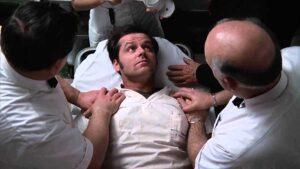Liver Cancer- Symptoms And Treatment
It is a condition when cells of the body begin to grow out of control. Liver cancer is the condition in which cells of the liver (hepatocytes) divide abnormally. Therefore, tumors develop in the liver cells which may cause jaundice, weight loss, stomach pain, tiredness, and vomiting.
Symptoms Of Liver Cancer
Having one or more symptoms from the list below does not mean you have cancer. Most of the symptoms are due to other conditions. Still, if you are facing any of the suspicions you must consult a doctor and get examined. The signs and symptoms of liver cancer are not visible up to later stages. Following are the most common symptoms of liver cancer.
- Weight loss
- Loss of appetite
- Feeling very full after a small meal
- Nausea or vomiting
- An enlarged liver
- An enlarged spleen
- Abdominal pain
- Skin and eyes turn to yellow color, which might be a condition of jaundice.
- Feeling tired and having no energy.
Some liver tumors are responsible for the production of hormones that affect organs other than the liver that may cause the following complications.
- Hypercalcemia (a condition where calcium level increases in the blood) can cause nausea, constipation, weakness, or muscle problems.
- Hypoglycemia ( a condition where sugar level decreases in the blood) can cause fatigue and fainting.
- Gynecomastia (Breast enlargement) and shrinkage of testicles in men.
- Erythrocytosis (Red blood cells increases) can cause someone to look red and flushed.
- Increased cholesterol levels.
Diagnosis
Here are some tests and procedures through which liver cancer can be diagnosed:-
Blood Tests- Various blood tests help to detect abnormalities in the liver.
Imaging Tests- Some imaging tests are recommended by some doctors such as CT Scan, Ultrasound, and MRI.
Using a sample of liver tissue for testing- Sometimes, a piece of liver tissue is obtained for laboratory testing to make a definitive diagnosis of liver cancer. During this, the doctor inserts a thin needle through your skin and into the liver to obtain a tissue sample. The tissue sample is then examined under the microscope to detect the presence of cancer cells. It has a higher risk of bleeding, bruising, and infections.
Determining the stage of the liver cancer
Doctors determine the extent of cancer after diagnosis. It helps in determining the size and location of the cancer cells. So, imaging tests help determine the stage of cancer.
Treatment
Treatment for primary cancers depends on the stage of the disease, your age, health, and personal preferences.
Surgery
- Surgery to remove the tumor- Sometimes, a doctor recommends removing the tumor and liver tissues that surround the tumor only if the tumor is in a small portion and the liver is functioning properly. This is an option for you also depends on the location of the cancer and the functioning of your liver.
- Liver transplant-The infectious liver is surgically replaced by a healthy liver.
Localized Treatments
- Heating cancer cells- Electric current helps to destroy cancer cells by radiofrequency ablation. By imaging tests, a doctor inserts one or more thin needles into small incisions into your abdomen. In other words, tumor cells are heated with an electric current to destroying the cancer cells.
- Freezing cancer cells- Cyroabation uses extreme cold to destroy cancer cells. During this doctor inserts an instrument containing liquid nitrogen directly onto liver tumors.
- Injecting alcohol into the tumor- Pure alcohol is injected into the tumor through injections. Alcohol kills the cancer cells
Radiation Therapy
High-powered energy from x-rays and protons helps to destroy cancer cells.
It is an option if, other treatment may not work or not possible. During beam radiation therapy you lie on a table and a machine directs the beam at a precise on your body.
Drugs or Chemotherapy
Drugs help in the killing of infected cells and restrict their abnormal multiplication.
Conclusion
Regular screening and early diagnosis result in more effective treatments. There is no solution for liver cancer at a high stage, but these treatments may suit some patients better than others. Patients need much information about liver cancer so that they can make the right decision. The best treatment for cancer patients is coping and support. So, one should keep their family and friends close, should talk to them about their hopes and fears.





